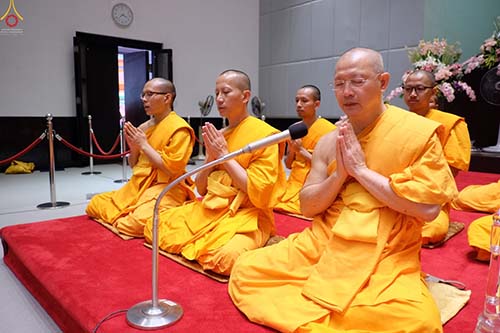
Motives for Ordination during the Time of Lord Buddha
During the time of Lord Buddha, men were motivated to be
ordained because of the prevalence of faith in their life for the
teachings of Lord Buddha, and in their desire to become an
Arahant, a person who has rid his mind of all impurities. Some of
these Arahants accumulated great merits over past lives. One
child of only seven years of age even after listening only briefly
to the teachings of Lord Buddha was immediately capable of
understanding the existence of suffering in the world, and thus
decided to be ordained without any hesitation. Even before the
monks finished shaving his head, the boy had already become an
Arahant. This Arahant’s name was Dabbamallaputta, one whose
birth in this world was fraught with difficulty.
Story of Dabbamallaputta
When Dabbamallaputta was in his mother’s womb, nearing
his time of birth, his mother suddenly died. Many people were
under the impression that he also, must have perished with his
mother. So his relatives took the body of his mother to a place of
cremation according to Indian tradition. As the flames of the
funeral pyre began to engulf his mother’s body, her womb opened
and the body of Dabbamallaputta emmerged and came to rest
upon a tuft of Elephant grass. If any other child had come into
this world under such dramatic circumstances, it would most cer-
tainly not have survived. Nevertheless, Dabbamallaputta’s birth
was indeed a miracle. He grew up under the watchful care of his
grandmother.Dabbamallaputta escaped death twice. First when his mother
suddenly passed away; under normal circumstances this would
have meant death for the unborn child. However, he did not
die. Second, when he escaped his mother’s womb as her body
lay on top of the funeral pyre, and came to rest on a tuft of
Elephant grass. That is where his name originated. M allaputta
meaning the child of the Malla family, and being his family name,
and Dabba meaning wild grass.
Later on the young Dabbamallaputta ordained as a novice.
While a novice, Dabbamallaputta earned the respect and admira-
tion from the monks at Wat Jetavana. The temple community saw
Dabbamallaputta as a person of great knowledge and talent, such
individuals being hard to find in this world.
Story of Rathapala
Like many other holy men before ordaining, Rathapala de-
sired worldly possessions. Nevertheless, the mercy, wisdom, and
purity of the Buddha’s teachings, managed to guide Rathapala
along towards the path of ordination.
Rathapala was the son of a wealthy family in Kururath Prov-
ince, India. Before he was ordained, he lived a sheltered and
comfortable life, more so than many of his fellow men.
However,Rathapala chose to be ordained. Many in his province
and village criticized and gossipped about the news of his deci-
sion to be ordained. Even the Raja who ruled over Kururath, felt
that Rathapala’s decision to be ordained was indeed strange. Whenthe Raja inquired why a person
might ordain, the response he
was given, was as follows. When confronted with one or all of
the following four circumstances, a person usually seeks refuge in
the monkhood
1. Old Age - The deterioration of one’s physical state and
abilities, finding that your life has no more roads to jour-
ney on.
2. Illness & Disease - When one’s body and health is af-
flicted with some illness and you are unable to move
forward in the world.
3. Poverty - w hen you reach that point in your life where
you no longer have monetary resources to advance your
life.
4. Shunned by Society - When your peers or those in your
community no longer accept you
One or all of these circumstances often push people to turn
towards a life of refuge in the monastic community.
The Raja commented that Rathapala was not yet old, he was
still strong and healthy, living a life free from poverty and sur-
rounded by many family and friends who loved and respected
him. Why then, has he chosen to be ordained?In ancient time, many men chose to be ordained when
con-
fronted with four circumstances, although they had no faith in
religion. Even during the time of Lord Buddha, many people
were ordained without faith in Buddhism. It is therefore not
surprising that the Raja found Phra Rathapala’s decision to be
ordained, a curious thought indeed.Phra Rathapala explained to the Raja that he had his own
four reasons for ordination these having been taught to him by
Lord Buddha. That in one’s life there are two types of suffering:
suffering that is unavoidable (past), and suffering that is avoidable
(present).
“All men are bound by unavoidable suffering from previous
lives, and yet we still reach out and grasp at more suffering to add
on to those from the past.”
These unavoidable suffering comprises:
1. That ageing is something that cannot be avoided. Those
who are wise should be always aware of this.
2. All living things are mortal. Death is something no living
being can avoid.
3. No one ever truly owns anything, for when you die, you
cannot take anything with you.
Suffering that is avoidable grows out of one’s constant desire
for more. People with such suffering are those who hunger
incessantly and are never satisfied. It is because they are a slave to
their never ending desires. People want everything that they see,
and even once they get it, they still yearn for more.